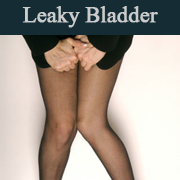
Do you get constant urges to pee and lose it when you cough, sneeze or laugh? You probably have leaky bladder which is similar to leaky gut and leaky vagina. It can be corrected with natural treatments.
This issue comes up alot with my patients who are peri and postmenopausal and those who have autoimmune conditions. Leaky bladder, leaky vagina and leaky gut have some things in common.
The International Society for the Study of Women's Sexual Health and the North American Menopause Society have noticed that menopausal women have this issue which they call genitourinary syndrome of menopause. Frankly, I think leaky bladder is a much more accurate term. When doctors have to coin a new condition it is usually more reflective of their discomfort with the subject than the patient. The authors of this new term have decided that many people will not say "vagina or discuss this quality of life issue". What century are we in? We talk about everything that is important to you at Second Nature.
Leaky bladder does not mean that you have inflammation or infection, but pathogens can cross the mucosal lining easier once the lining is breached.
Why is this happening? Leaky bladder is linked to decreased levels of estrogen and other steroid hormones. Your genitourinary structures have many estrogen receptors and once the estrogen levels drop you lose collagen and elastin which thins the skin cells. You also lose elasticity and flexibility because of a diminshed blood supply.
When estrogen drops the skin thins and you can experience burning, dryness, discomfort, pain with intercourse and general irritation of the reproductive organs and structures. Urinary urgency, loss of urine and recurrent infections can fall into the same category.
Take the Leaky Bladder Quiz
How many women in the United States are affected by overactive bladder?
- A.
1 of 3
- B.
1 of 7
- C.
1 of 20
According to an article published in Obstetrics & Gynecology, “[o]veractive bladder affects one out of seven U.S. women and is associated with considerable health care costs to the individual and healthcare system.”
First-line therapy for overactive bladder includes which of the following?
- A.
Acupuncture
- B.
Behavior and lifestyle modifications
- C.
Pharmacologic treatment
- D.
Cystoscopy
-
According to an article published in Obstetrics & Gynecology, “[f]irst-line therapy for overactive bladder includes behavior and lifestyle modifications; however, when these approaches are insufficient, the mainstay of second-line therapy is pharmacologic treatment.”
According to evidence, when do most patients with overactive bladder often discontinue pharmacologic therapy?
- A.
Within 6 months
- B.
Within 1 year
- C.
Within 2 years
-
According to an article published in Obstetrics & Gynecology, “[e]merging evidence suggests that overactive bladder agents are often ineffective for long-term management of symptoms with 60% or more of patients discontinuing [pharmacologic] therapy within 6 months.”
True or False. Symptoms associated with medical management of overactive bladder have only modest improvements and rarely resolve fully when treated with anticholinergic therapy, according to the results of randomized controlled trials.
- A.
True
- B.
False
-
According to an article published in Obstetrics & Gynecology, results of randomized controlled trials “suggest that the improvement in symptoms associated with medical management of overactive bladder is modest and rarely fully resolves symptoms. In addition, as a result of the relative paucity of data directly comparing agents, it is impossible to report that any specific agent is superior to any other in terms of efficacy or harms.” Researchers also went on to report that “[p]harmacotherapy for overactive bladder continues to be the mainstay of treatment for this condition and the largest class of medications for this indication is anticholinergic, although newer agents with different mechanisms continue to come to market.”
Reynolds WS, McPheeters M, Blume J, et al. Comparative Effectiveness of Anticholinergic Therapy for Overactive Bladder in Women: A Systematic Review and Meta-analysis. Obstetrics & Gynecology. 2015;1-10. doi: 10.1097/AOG.0000000000000851. Updated May 6, 2015. Accessed May 12, 2015.
- A.
- A.
- A.
Did you know that "leaky bladder" affects half of all postmenopausal women? It is clear that modern medicine does not offer a resolution for leaky bladder.
Some Second Nature patients go to Piermont Gynecology and are prescribed topical estrogen (it is not linked to estrogen positive cancers) and or topical lidocaine before sexual activity. I recommend that all menopausal women take GOOD GUT probiotics daily, remove identified food allergies and take natural herbal formulas to boost estrogen levels. I recommend DFH's Libido Stim F to boost estrogen levels and I have homeopathic remedies to increase estrogen without the fear of cancer. Flax seeds, organic soy, pomegranites, alfalfa and certain herbs provide some estrogens. I have great clinical experience with D-Mannose for leaky bladder. I recommend Xymogen's UritraX to seal the mucosal lining in the bladder. We use ozonated olive oil to seal the thinned tissues for the vagina and bladder.
Don't be embarrassed. Call us and let's work on your plan of action to improve your quality of life.
- Looking for a Few Good Men - Fix that Leaky Gut
- How to Fix Leaky Gut Syndrome
- Leaky Gut - The Root of all Chronic Disease
- Exercise and GOOD GUT products boost the intestinal microbiome
- Everyone needs Testosterone - Men, Women and Children
- Women can prevent their own pain - Vaginal pain management


